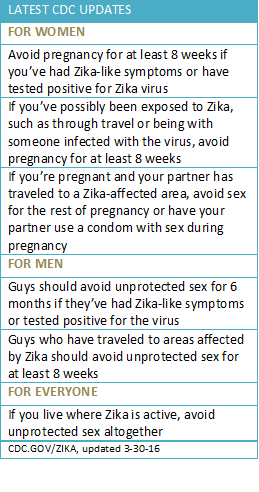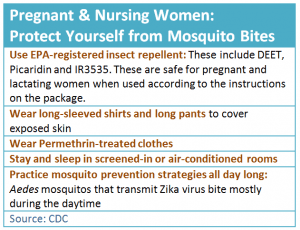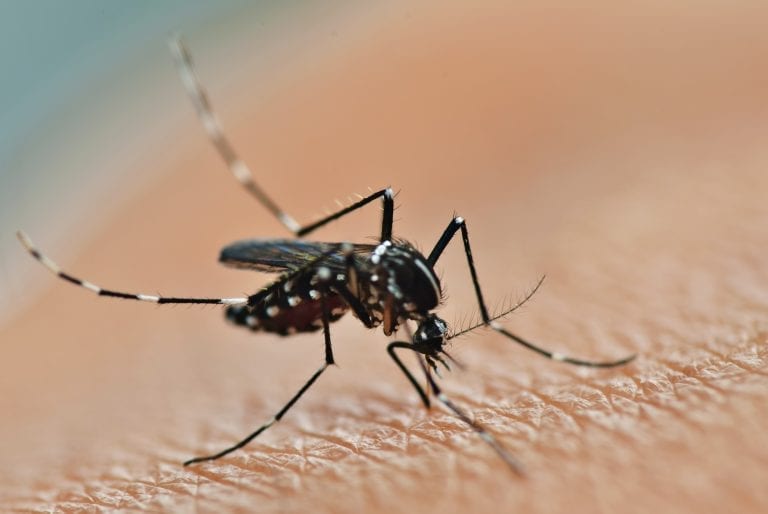Zika virus is news all over the globe, so you may be wondering how it may affect you and your baby.
You may be especially concerned about a link between having the virus and giving birth to a baby with a small head, and subsequently, a smaller brain. This is a birth defect and neurological problem called microcephaly. Experts have observed an increase in babies being born with microcephaly and other problems in countries where there has been a large number of Zika infections, such as Brazil.
Although there is an increased number of babies in Brazil being born with microcephaly to moms who had or may have had Zika in pregnancy, more research needs to be done to truly know if the virus caused microcephaly in their babies.
So far, most of the people diagnosed with Zika in the U.S. have recently traveled to one of the Caribbean or Latin American countries where there is a known outbreak of the virus. If you or someone you know hasn’t been to these countries, your risk of Zika affecting your pregnancy is very low. Being informed about any disease and knowing how to protect yourself is always important, so here are some common questions and answers from the experts at the Centers for Disease Control & Prevention (CDC) about Zika. Keep up to date on Zika at CDC.gov/zika.


Zika is spread through mosquito bites. Zika is transmitted particularly by the Aedes mosquito, which bites mostly during the day. These same mosquitoes are found in the southern U.S. but so far no case of infection from an Aedes mosquito in the U.S. has been confirmed. Mosquito control is much more aggressive in the U.S. as compared to many countries where the virus is active. Other mosquito-borne diseases you may recognize include Dengue, West Nile Virus or Malaria.
If you’ve recently traveled to an affected country, avoid trying to conceive for at least a week or more as the virus usually remains in your blood for only a few days up to a week. Tell your healthcare provider that you’ve traveled to a country where Zika is active.
Can I prevent Zika?
Protecting yourself against mosquito bites is the best way to prevent diseases spread through mosquitos, including Zika. Depending on how you react to mosquitos, you may not even realize you’ve been bitten. Only 1 in 5 people who get infected develop symptoms, and even then the illness is usually mild. Experts believe Zika infection may occur up to a week before symptoms emerge; however, they caution that because symptoms can be so mild, a person may have Zika and not notice its symptoms.
Avoid mosquito bites by using a bug spray with DEET, covering exposed skin with clothing, using Permethrin-treated clothing, and staying in screened-in areas. Insect repellents including those with DEET can be safely used in pregnancy or if you are trying to get pregnant if you follow the instructions on the label.
What are Zika’s symptoms?
Zika infection usually appears as red eyes, known as conjunctivitis, pain in your joints, fever and rash. The symptoms usually start 2-7 days after you have been bitten and the symptoms may be so mild you may not realize you have been infected.
Can Zika be treated?
Currently there is no vaccine to prevent Zika and no treatment once you have it. Avoiding mosquito bites is your best protection. If you get infected, the CDC advises plenty of rest, fluids, and pain medications like acetaminophen for fever or pain. Avoid aspirin and NSAIDs like ibuprofen as these could potentially lead to clotting complications if, in fact, you have dengue not Zika. Both viruses are carried by Aedes mosquitos. Let your healthcare provider know if you think you have Zika.
How does Zika affect sex between me and my partner?
If your partner has recently traveled to an area with a Zika outbreak, the CDC is advising that your male partner use condoms during any sexual activity in which you engage with him. You can get the Zika virus through sexual activity, and this is particularly a problem if you’re pregnant or trying to conceive. So far, one case has emerged where Zika was transmitted to a partner through semen. So far, there are no cases of a woman who has been diagnosed with Zika or who has traveled to an area where Zika is active and who has transmitted the virus to her partner.
If you’re pregnant, it’s particularly important that you either abstain from sex for the rest of your pregnancy, or that your partner uses a condom correctly every time you have sex (i.e., vaginal intercourse, anal intercourse, or oral sex [fellatio]) during pregnancy. Tell your healthcare provider if your partner has traveled to areas where Zika is active, and particularly if your partner has been diagnosed with Zika. Discuss what testing options are available with your healthcare provider if you’re concerned you may have been exposed to Zika while pregnant.
I’m pregnant, how do I protect myself from Zika?


If you must travel to one of these areas, it’s essential to talk with your healthcare provider before you go. CDC also recommends that if you’re trying to get pregnant and are planning to travel to these areas, consider postponing your trip.
If you’re pregnant and live in an area where Zika is active you have an ongoing risk for Zika throughout your pregnancy, see your healthcare provider for testing and the latest advice regarding how to prevent and manage your risks for Zika. If you have symptoms of Zika, see your healthcare provider immediately for testing and care; this is best accomplished within the first week of symptoms.
If you have recently traveled to one of these areas, especially if it was in the past two weeks, see your healthcare provider. This is especially important if you notice that you have a mosquito bite or have any signs and symptoms. Your healthcare provider may want to do blood and other tests to look for the virus or an ultrasound to check on your pregnancy; the optimal time for testing is from 2-12 weeks from your potential exposure to Zika. It’s unknown if Zika infection can affect future pregnancies; typically it remains in an infected person’s blood for up to a week.
Can Zika affect my baby at birth?
If you have Zika, your baby can contract the virus during pregnancy and birth, although experts don’t know how often this may happen. It’s safe to breastfeed baby if you’ve had a Zika infection; little if any of the virus may transmit through your milk and the benefits of breastfeeding and breast milk far outweigh the risks, say experts at the CDC. To date, there are no reports of babies getting Zika virus through nursing, they advised, and added that because of the benefits of breastfeeding, mothers are encouraged to breastfeed even in areas where Zika virus is found.
| Learn More About Zika |
| Learn more about Zika virus, mosquito bite prevention and safe use of insect repellents at the following CDC links: |
| · Zika |
| · Countries to avoid during outbreak |
| · Insect Repellant |
| · Similar infections |
Prevent Mosquito Bites:
There is no foolproof way to prevent mosquito bites. CDC experts advise that you:
- Wear long sleeves and long pants to cover exposed skin
- Wear Permethrin-treated clothes
- Stay in air-conditioned and screened-in rooms
- Use EPA-registered insect repellents (pregnant women may use repellents that contain all of the following if used as directed: DEET, Picaridin, IR3535)
- Practice mosquito prevention all day long
If you have a baby or child:
- Dress your child in clothing that covers arms and legs
- Cover crib, stroller or carrier with mosquito netting
- Don’t use insect repellent on babies younger than 2 months
- For children 2 months old or older, apply insect repellent first on your own hands, and then to your child’s skin, avoiding their hands, eyes, mouth, and cut or irritated skin
- Treat clothing and gear with permethrin or purchase permethrin-treated items
Related articles









Comments are closed.